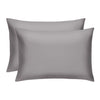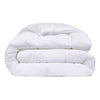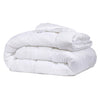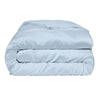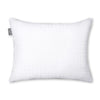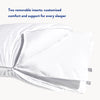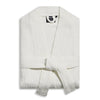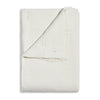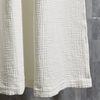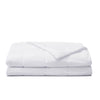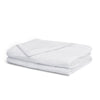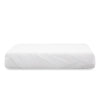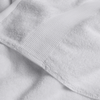The Daily Miracle
How To Whiten Bed Sheets: 5 Tips & Tricks
Published
May 22, 2025
Author
John Tsenekos

There’s nothing quite like slipping into a bed made with crisp, white sheets until you notice those stubborn yellow stains or dingy patches that just won’t go away. If you’ve ever wondered why your once-bright bedding looks a little less inviting these days, you’re definitely not alone. White sheets are a classic for a reason, but keeping them looking fresh can feel like an uphill battle, no matter how careful you are.
Maybe you’re getting ready for guests, refreshing your bedroom, or just want your bed to look as clean and inviting as possible. Whatever your reason, you deserve sheets that look as good as they feel. The good news? With the right care and a few smart tricks, you can bring back that hotel-fresh look and keep your white sheets looking their best.
Why Do White Sheets Turn Yellow or Dingy?
It’s frustrating when your white sheets start to lose their brightness, but there’s a reason it happens to almost everyone. Over time, everyday things like body oils, sweat, and even your favorite skincare products can build up on your bedding. These invisible culprits slowly leave behind yellowish stains and dull patches, especially in areas where you rest your head or body the most.
Detergent residue can also play a part. If your sheets aren’t rinsed thoroughly, leftover detergent can attract dirt and make fabrics look less than fresh. Even with regular washing, these factors add up, making it tough to keep your sheets looking as crisp as the day you bought them.
The good news is, once you know what’s causing the problem, you can take steps to tackle it and bring back that clean, bright look you love.
How To Whiten Bed Sheets: Easy 5-Step Guide
Bringing your white sheets back to their original brightness is easier than you might think. Just follow these simple steps:
Step 1: Pre-Treat Stains and Yellowing Start by checking your sheets for any visible stains or yellowed areas. Apply a natural solution like baking soda, white vinegar, or lemon juice directly to the spots. Let it sit for about 30 minutes to help break down stubborn discoloration.
Step 2: Wash with the Right Products Wash your sheets in the hottest water that’s safe for the fabric. Use a gentle, all-natural detergent to protect both your bedding and your skin. For an extra whitening boost, add a scoop of baking soda or a cup of white vinegar to the wash cycle.
Step 3: Soak for Deep Cleaning (Optional) If your sheets are especially dingy, soak them in a mixture of warm water and hydrogen peroxide before washing. This can help lift deep-set stains and restore brightness.
Step 4: Rinse Thoroughly Make sure to rinse your sheets well to remove any leftover detergent, which can attract dirt and make fabrics look dull over time.
Step 5: Dry in the Sun Whenever possible, dry your sheets outside in the sunlight. Sunlight naturally helps whiten fabrics and leaves your bedding smelling fresh.
Safe and Effective Ways to Whiten Bed Sheets
Restoring the brightness of your white sheets is all about using the right techniques and being mindful of your fabric’s needs. Here are some additional strategies to help you achieve that crisp, clean look without repeating what you already know.
Pre-Treating Stains and Yellowing
Consider rotating between different natural pre-treatments to target a variety of stains. For example, a gentle enzyme-based cleaner can be especially effective on protein-based stains like sweat or drool. For persistent discoloration, try soaking your sheets overnight in a solution of water and oxygen-based bleach (like sodium percarbonate), which is less harsh than traditional bleach and safe for most fabrics.
Washing Methods for Whitening Sheets
If your sheets are safe for it, try a double-wash method: run them through a short wash cycle first to loosen dirt, then follow with your regular wash using your preferred detergent. This two-step process can help remove buildup that a single wash might miss. You can also alternate between warm and cold water cycles to help dissolve different types of residues.
For those looking to avoid any residue, consider an extra rinse cycle at the end of your wash. This ensures all cleaning agents and boosters are fully removed, leaving your sheets feeling softer and looking brighter.
Avoiding Damage While Whitening
To keep your sheets in top condition, avoid using fabric softeners, which can leave behind a coating that attracts dirt and dulls whites over time. Instead, opt for a half-cup of white vinegar in the rinse cycle to naturally soften fabric and help maintain brightness.
Finally, be gentle when handling wet sheets. Avoid wringing or twisting, as this can damage fibers and lead to premature wear. Lay sheets flat or hang them evenly to dry, which helps prevent stretching and keeps them looking their best.
Natural and Eco-Friendly Whitening Solutions
You don’t have to rely on harsh chemicals to get your white sheets looking bright again. There are plenty of natural, eco-friendly methods that are gentle on both your bedding and the environment.
DIY Recipes for Whitening Soaks and Washes
Try a simple whitening soak by mixing half a cup of baking soda with warm water in a large basin or bathtub. Let your sheets soak for a few hours, then wash as usual.
For extra power, add a splash of white vinegar or squeeze in some fresh lemon juice, as both are known for their natural brightening abilities. Another easy option is to create a paste with hydrogen peroxide and baking soda, then apply it directly to stubborn stains before washing.
Supporting a Cleaner, Greener Laundry Routine
Switching to all-natural laundry products is a smart way to care for your sheets and the planet. Miracle Laundry Detergent Sheets are a great example of this. They’re powerfully concentrated, made with all-natural ingredients, and gentle on sensitive skin.
How Can You Prevent Future Yellowing and Stains?
Keeping your white sheets looking bright is easier when you take a few simple steps to protect them from everyday buildup. Here are some practical tips to help you maintain that fresh, clean look:
-
Wash your sheets every one to two weeks to prevent oils, sweat, and residue from setting in.
-
Always follow the care instructions on your sheet’s label to avoid damaging the fabric.
-
Use a gentle, all-natural detergent like Miracle Laundry Detergent Sheets to keep your bedding clean without harsh chemicals.
-
Avoid overloading your washing machine. This ensures your sheets get thoroughly cleaned and rinsed.
-
Dry your sheets in the sun when possible; sunlight naturally helps whiten and freshen fabrics.
-
Store your sheets in a cool, dry place away from direct sunlight to prevent yellowing and fading.
-
Make sure sheets are completely dry before folding and storing to avoid musty odors or mildew.
-
Rotate between two or more sets of sheets to reduce wear and keep each set looking newer, longer.
When to Replace Your White Sheets
Even with the best care, every set of sheets eventually reaches the end of its lifespan. Knowing when it’s time to replace your white bedding ensures you always enjoy a fresh, comfortable sleep environment. Here are some signs it might be time for an upgrade:
-
Persistent stains or yellowing that won’t come out, no matter what you try
-
Noticeable thinning, fraying, or holes in the fabric
-
Loss of softness or comfort, even after washing
-
Faded color or a dull, grayish appearance
-
Elastic corners that no longer hold the sheet in place
Investing in high-quality, long-lasting sheets pays off in the long run. Premium bedding not only feels better against your skin, but it also stands up to frequent washing and daily use. When you choose durable, well-made sheets, you’ll enjoy a cleaner, more inviting bed for years to come.
Conclusion
Keeping your white sheets looking bright and fresh doesn’t have to be a struggle. By understanding what causes yellowing and stains, using gentle pre-treatments, choosing the right washing methods, and sticking to natural, eco-friendly solutions, you can restore your bedding’s crisp appearance and extend its lifespan. Remember, a little extra care goes a long way. Regular washing, proper storage, and mindful product choices all help keep your sheets inviting night after night.
Sources:
-
Can the Sun Actually Disinfect Your Laundry? | HealthNetwork
-
How Often Should You Wash Your Bed Sheets? | Business Insider


